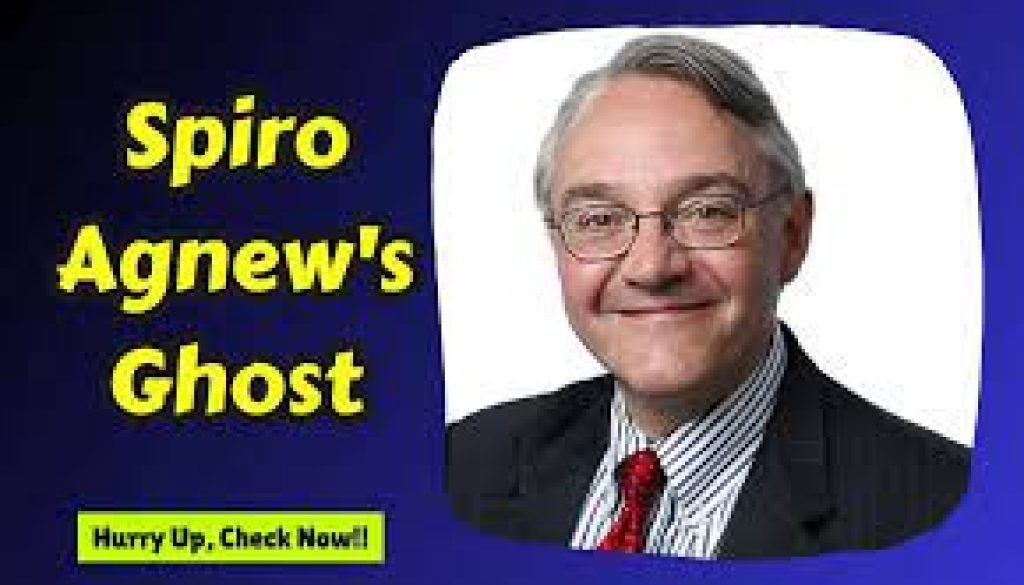A critical examination of political scandals and their contemporary significance is presented in “Spiro Agnew’s Ghost.”
Introduction
The annals of political history are woven with moments of grandeur and disgrace, shaping a complex narrative where certain figures are celebrated for their achievements, while others are remembered for their controversies. Within this intricate tapestry, Spiro Agnew’s Ghost, the 39th Vice President of the United States, undoubtedly falls into the latter category. Agnew’s tumultuous political journey, culminating in his resignation amid allegations of bribery and tax evasion, left an indelible mark on American politics. This exploration delves into Spiro Agnew’s life and scandals, delving into both the enduring political legacy he left behind and the threads connecting his story to contemporary political currents.
Emergence of Spiro Agnew
Spiro Theodore Agnew’s ascent in American politics commenced in the modest state of Maryland, where he initially gained prominence as the Baltimore County Executive. His charisma and political acumen propelled him to the position of Maryland’s governor, solidifying his status as a rising conservative luminary. It was this reputation that caught the attention of Richard Nixon, leading to Agnew’s selection as Nixon’s running mate in the 1968 presidential race. Agnew embodied the fervent ideological spirit of the era with his unwavering conservatism and the ability to rally the Republican base, making him an appealing choice for the vice presidential slot.
Veiled Controversies
While the Nixon administration was marred by larger scandals, Agnew’s own controversies often lingered in the background. Despite the eventual dominance of the Watergate crisis, Agnew’s conduct and rhetoric faced scrutiny. His speeches resonated deeply with conservative followers but also drew censure for their polarizing nature, characterized by fiery rhetoric and scathing critiques of the media. Agnew’s harsh condemnation of the media as “nattering nabobs of negativism” and his accusations of bias contributed to mounting unease in the American political landscape. Though effective in galvanizing his supporters, this approach sowed the seeds for a lasting divide between politicians and the media.
The Fall from Grace
Agnew’s political career underwent an abrupt and dramatic transformation when he was accused of bribery, extortion, and tax evasion in 1973. Allegations of illicit acceptance of bribes from contractors during his tenure as Maryland’s governor formed the crux of the charges. Faced with the prospect of impending charges, Agnew chose to resign from the vice presidency in 1973. He became only the second vice president in American history to step down due to scandal, leaving an indelible mark on the historical record.
Parallels with the Present Spiro Agnew’s Ghost
Despite the distinct disparities between the political landscapes of the 1970s and the contemporary era, intriguing parallels emerge between Spiro Agnew’s Ghost scandals and current political developments. Notably, the strained relationship between politicians and the media continues to shape American politics. Leaders employ divisive rhetorical tactics to undermine critical coverage, mirroring Agnew’s efforts to discredit the media—underscoring both his historical effectiveness and the enduring nature of such strategies.
Agnew’s swift downfall also imparts a timeless lesson on the perils of unchecked power. Public officials navigate their responsibilities under the scrutiny of immediate communication and heightened oversight. Agnew’s unmasking underscores the value of accountability, a lesson that resonates particularly in today’s political climate.
Lessons Unearthed
The specter of Spiro Agnew’s Ghost endures, a constant reminder of the intricate interplay between political influence, scandal, and public opinion. His meteoric rise and rapid fall underscore the cyclical nature of political fortunes. Agnew’s narrative imparts crucial insights as contemporary leaders grapple with their own challenges:
Ethical Leadership: Agnew’s downfall underscores the paramount significance of ethical leadership and the consequences of forsaking integrity for personal gain. Modern leaders must prioritize honesty and ethical conduct in an era of unceasing public scrutiny.
Media Relations: The contentious relationship between politicians and the media persists. Agnew’s media-handling strategies remain pertinent today in the battle for media credibility. A robust, independent press continues to be a cornerstone of democracy, holding authority accountable and safeguarding democratic principles.
Accountability: Agnew’s resignation serves as a stark reminder that no one is above the law. Today’s leaders must recognize that upholding public trust demands transparency and accountability.
Political Polarization: Agnew’s incendiary rhetoric foreshadowed the current state of intense political polarization. The challenge of balancing diversity and unity endures through time.
Conclusion
The lingering specter of Spiro Agnew serves as a solemn reminder of the intricate interplay between political power, morality, and media dynamics. His ascent, tumultuous tenure, and swift downfall provide a lens through which to scrutinize the intermingling of these elements. Agnew’s legacy stands as a poignant testament to history’s enduring influence on shaping our present and sculpting our future as we navigate the intricate labyrinth of contemporary politics.



